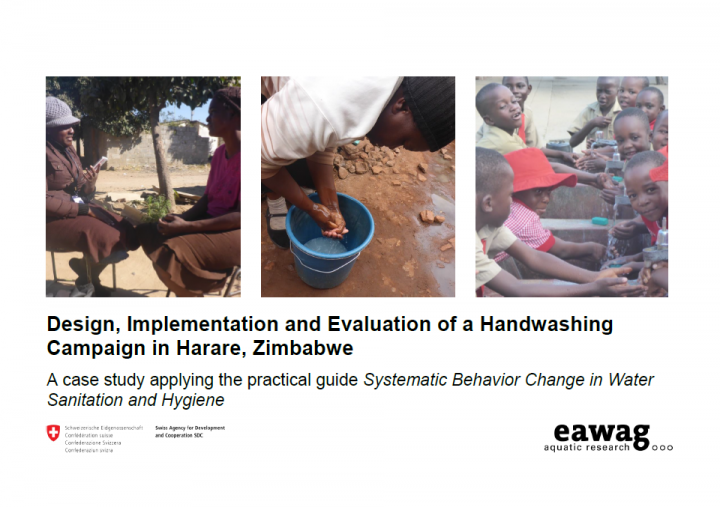Design, Implementation and Evaluation of a Handwashing Campaign in Harare, Zimbabwe. A Case Study Applying the Practical Guide Systematic Behavior Change in Water, Sanitation and Hygiene Friedrich, M. (2016)
Consistent hand hygiene can reduce morbidity and mortality from diarrheal and respiratory diseases. Diarrhea and pneumonia are still the leading causes of mortality among children under five years of age in low-income and middle-income countries. Recent findings suggest that interventions promoting handwashing with soap lead to a 40% reduction in the risk of diarrhea. Despite its health impact, handwashing with soap is seldom practiced. It is estimated that less than 20% of people worldwide wash hands with soap after contact with feces, with a mean prevalence of 13% to 17% in low- and middle-income regions. Considering these low handwashing rates, interventions promoting handwashing behavior are of paramount importance. The objectives of our project were to promote handwashing with soap at critical times among school children, caregivers, and policy makers in Harare, Zimbabwe and to disseminate the results among international actors in the water, sanitation, and hygiene (WaSH) sector. The handwashing campaign is part of the second phase of the Handwashing in India and Africa project initiated and funded by the Swiss Agency for Development and Cooperation (SDC). High-density suburbs of Harare, Zimbabwe and the province of Ngozi in rural Burundi were chosen as pilot areas for the handwashing campaigns. While the political situation in Burundi did not allow the project to be completed there, the part in Zimbabwe was largely implemented as planned and is the subject of this case study. The campaign was designed by Eawag in collaboration with the Università della Svizzera Italiana and WASH United. The data collection was implemented by Eawag in collaboration with the University of Zimbabwe. The campaign was implemented by ActionAid Zimbabwe and in collaboration with the Ministry of Health and Child Welfare of the Government of Zimbabwe and Eawag. This case study aims at illustrating how Systematic Behavior Change in Water, Sanitation and Hygiene. A practical guide using the RANAS approach by Hans-Joachim Mosler and Nadja Contzen1 (referred to in this case study as Systematic Behavior Change) was applied in a real project. The structure of this case study follows the steps of Systematic Behavior Change exactly: It presents how we put each phase, step, and key action described in Systematic Behavior Change into practice during our handwashing campaign in Zimbabwe and what the results were. Our aims are to bridge the gap between the steps described in Systematic Behavior Change and their application in the field and to inspire practitioners to follow our example.
Bibliographic information
Friedrich, M. (2016). Design, Implementation and Evaluation of a Handwashing Campaign in Harare, Zimbabwe. A Case Study Applying the Practical Guide Systematic Behavior Change in Water, Sanitation and Hygiene eawag
Filter / Tags
Case studies in other formatsEnglish
Downloads
Design, Implementation and Evaluation of a Handwashing Campaign in Harare, Zimbabwe. A Case Study Applying the Practical Guide Systematic Behavior Change in Water, Sanitation and Hygiene
Type: application/pdf
Size: 1.13 MB

